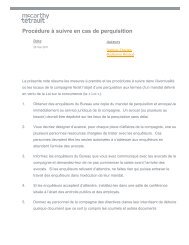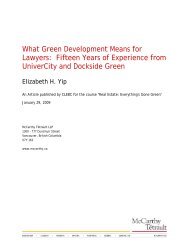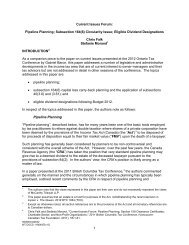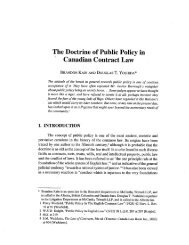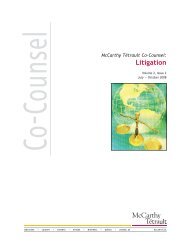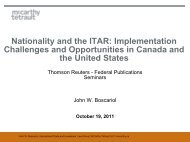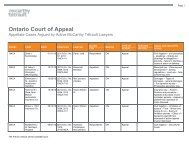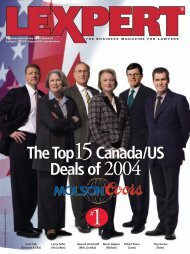1. COMPETITION - McCarthy Tétrault
1. COMPETITION - McCarthy Tétrault
1. COMPETITION - McCarthy Tétrault
You also want an ePaper? Increase the reach of your titles
YUMPU automatically turns print PDFs into web optimized ePapers that Google loves.
It should be noted that while the Resolution does not require a telecom<br />
permit for use of Wi-Fi equipment, importers or manufacturers of such<br />
goods must obtain a certificate from Subtel attesting that they sufficiently<br />
comply with Chilean technical requirements.<br />
Subtel's Resolution is concordant with its policies to encourage new<br />
technologies and to increase free competition among different operators in<br />
the market. Additionally, Subtel has indicated that it is evaluating the use of<br />
Wi-Fi technology in open areas.<br />
As a result of the Resolution, five companies to date are providing Wi-Fi<br />
services in Chile, and many others are expected to soon follow.<br />
For more information please contact: asilva@carey.cl,<br />
msanhueza@carey.cl or nbakovic@carey.cl<br />
HK<br />
REGULATION OF CHANGE OF<br />
SHAREHOLDINGS OF TELECOM COMPANIES<br />
The Telecommunications Ordinance has been amended to give the<br />
Telecommunications Authority (the "Authority") power to regulate the<br />
change of carrier licensees' shareholdings. The amendment was passed<br />
on 18th July 2003, but its principal provisions will take effect at a later date<br />
as determined by the Secretary for Commerce, Industry and Technology.<br />
The Authority also issued draft guidelines on 4th August 2003 to explain<br />
how it will enforce the amended provisions. The guidelines are available<br />
for public consultation until 29th September 2003.<br />
Once the new rules enter force, any person who intends to own a<br />
significant equity share in a telecom carrier will need to consider both the<br />
effects on competition in the telecom market and whether consent from the<br />
Authority is required.<br />
For more information visit: http://www.ofta.gov.hk/report-paperguide/paper/consultation/cp20030804.pdf<br />
or please contact: dae@jsm.com.hk<br />
HK<br />
TELECOM SERVICE OPERATORS'<br />
ACCESS TO PRIVATE BUILDINGS<br />
TELECOM OPERATORS' RIGHT OF ACCESS<br />
Telecom operators may access private buildings only to install and<br />
maintain facilities that are necessary to provide services to building<br />
residents. Operators may access only the common parts of buildings, and<br />
may not carry on marketing and promotional activities in buildings.<br />
Before entering a building, a telecom operator should obtain prior<br />
permission from building management. Without such permission, building<br />
management may take action against the telecom operator for<br />
unauthorized entry and/or nuisance. If building management refuses to<br />
grant access upon request, the telecom operator can:<br />
• approach the Office of the Telecommunications Authority for<br />
mediation;<br />
• apply to a magistrate for an order requiring building management to<br />
comply; or<br />
• apply to the Telecommunications Authority for a certificate certifying<br />
that it has a statutory right of access.<br />
TELECOM OPERATORS' OBLIGATIONS<br />
The telecom operator is required to:<br />
• cause as little damage as possible to the building;<br />
• pay the full cost of installation; and<br />
• pay the electricity bill for the power supply to their equipment (unless<br />
building management agrees otherwise).<br />
COORDINATOR FOR TELECOM OPERATORS<br />
In the event that there is more than one telecom operator interested in<br />
accessing the same building, one of these telecom operators should be<br />
appointed as a coordinator to lease with building management.<br />
The coordinator's main responsibilites are to:<br />
• work out a consolidated proposal;<br />
• coordinate installation work to minimize disruption to residents; and<br />
• act as one contact point among the Office of the Telecommunications<br />
Authority, building management, and the telecom operators involved.<br />
Points to note by the building's incorporated owners and office of building<br />
management<br />
Although telecom operators are entitled to access the common parts of<br />
buildings, those parts remain the property of land managed by building<br />
management. Accordingly, as long as the telecom operators' statutory right<br />
of access is not curtailed or inhibited, building management may, in good<br />
faith, negotiate with telecom operators as to the technical and operational<br />
details of the access. Guidelines suggest the following:<br />
Before commencement of installation or maintenance work, building<br />
management should:<br />
• provide relevant building drawings and layout plans of the common<br />
parts, if available, to the telecom operator;<br />
• respond promptly to the telecom operator's request for site visits within<br />
14 days upon receipt of a written request from the telecom operator,<br />
and give at least 5 working days advance notice to the telecom<br />
operator of the agreed date of the site visit;<br />
- obtain a consolidated proposal which contains all the requirements of<br />
the telecom operator;<br />
• review the proposal by considering the date and time for carrying out<br />
the relevant work, the arrangement for workmen to access the<br />
building, the installation method and location of the equipment, and the<br />
arrangement for operation and maintenance of the equipment in<br />
future; and<br />
• confirm with the telecom operator the acceptance of the proposal, and<br />
provide a start-date for the relevant work.<br />
After installation or maintenance work is commenced, building<br />
management should:<br />
• permit and assist the telecom operator to access the common parts of<br />
the building and the in-building telecommunications system in order to<br />
install the required equipment; and<br />
• make available space in the common parts and the in-building<br />
telecommunications system to the telecom operator.<br />
Overall, building management should NOT:<br />
• impose any fees, deposit, or access charge on the telecom operator<br />
for access to the building or the use of the common parts of the<br />
building;<br />
• demand that the telecom operator employ the contractor or company<br />
nominated by building management to install the telecom operator's<br />
antenna, cable and/or equipment; or<br />
• limit the choice of technology to be used or predetermine the access<br />
method of the telecom operator.<br />
For more information please contact: dae@jsm.com.hk<br />
ISSUE 22 SEPTEMBER – OCTOBER 2003 14



